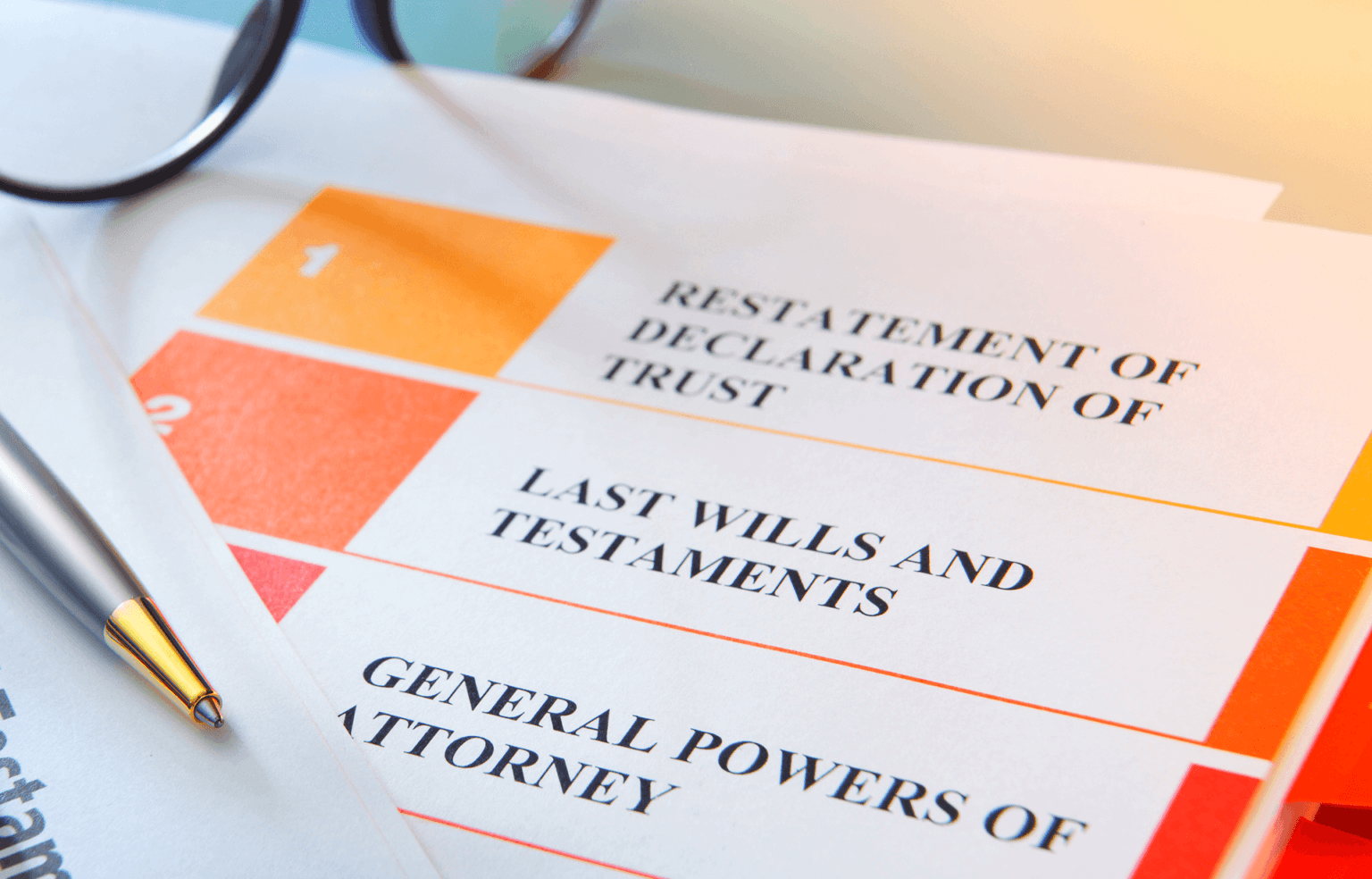Wills & Power of Attorney

Whether it coordinating the distribution of your assets after death through a will or giving someone the legal authority to make decisions on your behalf we are to address all of your needs.
TOP 10 QUESTION AND ANSWERS ABOUT WILLS
-
What is a will?
A person’s will is a written document that sets out the person’s wishes about how his or her estate should be taken care of and distributed after death. It takes effect when the person dies.
-
What is an estate?
An estate is a property that a person owns or has a legal interest in. The term is often used to describe the assets and liabilities left by a person after death.
-
What is trust?
A trust is created to hold property or assets for the benefit of a particular person called the beneficiary. It is managed by a person called a trustee, who has an obligation to deal with the property for the beneficiary of the trust. There are many different kinds of trusts.
-
My spouse has died. What does it mean to make an election under the Family Law Act?
In law, an election is a legal decision or choice. When a married spouse dies and has left a will, the surviving spouse can make an election to receive:
- An equalization payment under the Family Law Act, or
- His or her entitlement under the will.
When a married spouse dies and there is no will, the surviving spouse can make an election to receive:
- An equalization payment, or
- His or her entitlement as a spouse under the Succession Law Reform Act.
A surviving spouse has six months from the date of the spouse’s death to make an election. If an election is not made within six months, the spouse will be granted his or her entitlement under the will, or under the Succession Law Reform Act if there is no will.
The election has important impacts on the rights of the surviving spouse. Surviving spouses should seek legal advice before making an election.
-
How do I apply for death benefits?
There are benefits from the federal government, which may be available to a surviving spouse and dependent children of a deceased person and to the deceased person’s estate.
-
Can I express my wishes in advance?
Ontario laws recognize that your known wishes expressed while mentally capable about your future care choices will be binding on your attorney or other substitute decision-makers, unless they are impossible to follow.
Ontario law does not use the term “living will’. Sometimes people use the term “advance directive” to refer to a written statement of wishes about future care.
-
Is an “advance directive” the same thing as a “Power of Attorney”?
No. A Power of Attorney is a legal document in which you name a specific person to make decisions on your behalf. You can, however, write your treatment wishes (an “advance directive”) as part of your Power of Attorney for Personal Care so that you can be sure your attorney is aware of them. An “advance directive” just addresses your treatment and personal care wishes and does not need to name anyone or be written in any specific way.
-
Is a Power of Attorney the same thing as a “Last Will and Testament”?
No. Your Last Will and Testament covers the distribution of your property after you die and only takes effect upon your death. A Power of Attorney only applies while you are alive and ceases to be effective upon your death.
-
Do I have to register my Power of Attorney with the government?
No. There is no requirement that these documents be registered. The government does not keep a registry. It makes sense, however, to make sure that the people in your life who need to know about these documents – especially your attorney – have a copy or know where to get one if needed.
-
Is a Power of Attorney effective outside of Ontario?
It depends on the law of the particular place where you want to use the Power of Attorney. If you are going to move, or be out of the province for some time, you may want to check with a local lawyer to see if you need to make new documents.
TOP 10 QUESTIONS ABOUT POWERS OF ATTORNEY
-
What is a Power of Attorney?
A Power of Attorney is a legal document that gives someone else the right to make decisions on your behalf.
-
Are there different kinds of Power of Attorney?
Yes. In Ontario there are three kinds of Power of Attorney:
- A Continuing Power of Attorney for Property (CPOA) covers your financial affairs and allows the person you name to make decisions for you even if you become mentally incapable.
- A non-continuing Power of Attorney for Property covers your financial affairs but can’t be used if you become mentally incapable. You might give this Power of Attorney, for example, if you need someone to look after your financial transactions while you’re away from home for an extended period of time.
- A Power of Attorney for Personal Care (POAPC) covers your personal decisions, such as housing and health care.
-
Does the law require everyone to have a Power of Attorney?
No. Making a Power of Attorney is voluntary. No one can be forced to make one.
-
What does the term “attorney” mean?
The term “attorney” refers to the person or persons you have chosen to act on your behalf. The person does not have to be a lawyer.
-
What does the term “mentally incapable” mean?
It means different things for different types of decisions and actions. For example, the level of mental capacity a person needs in order to make a valid power of attorney is different from the capacity needed to make personal care or financial decisions. The definitions are provided below under the topic headings.
-
How do I prove I’m an heir (someone who inherits property) to an estate?
If someone dies without a will in Ontario and the Office of the Public Guardian and Trustee is appointed by the Court as the estate trustee, any person claiming a share of the estate will have to prove they are entitled to inherit.
-
How is an estate distributed?
When a person dies with a will, the estate is distributed according to the directions in the will.
When a person dies without a valid will (intestate), Ontario’s law on intestate succession requires a specific distribution of the estate.
-
How can I find out what happened to an estate of a family member?
You should first contact the Superior Court of Justice in the county where your relative lived at the time of his or her death, to see if someone was appointed estate trustee.
-
Where can I find court forms for estate proceedings?
You should contact your Family-First litigation team here at Benjamin law for all of your legal form needs, as there are a multitude of them.
-
Why is the Public Guardian and Trustee involved in an estate or trust matter?
The Public Guardian and Trustee play a role in protecting mentally incapable people, protecting the public’s interest in charities, searching for heirs, investing perpetual care funds, and dealing with dissolved corporations.
BOOK YOUR FREE CONSULTATION
Fill out the Case Evaluator form below to discuss your case or claim with one of our experienced Family-First legal professionals. At Benjamin Law, we work hard, and fast to get you justice, to solve your problems, and get you the compensation that you deserve.
Contact Us
We will get back to you as soon as possible.
Please try again later.
Let your family of lawyers represent you
Ontario Law Society Update
According to standards outlined by the Law Society of Ontario our maximum fees charged on any claim is 33%. For more info visit The Law Society of Ontario.
Quick Links
Practice Areas
Head Office
Toronto
1018 Finch Avenue West, Unit 301
North York, Ontario M3J 3L5
Brampton
470 Chrysler Drive, Units 1&2
Brampton, ON L6S 0C1
Ajax
577 Kingston Rd.,
Ajax, ON L1S 6M1
The information contained on this website is for general information purposes only.
No information on this site should be construed or regarded as legal advice for any claim, dispute, or issue.
Viewing or receipt of this information does not constitute or intend to establish an attorney-client relationship.
All Rights Reserved - Benjamin Law
